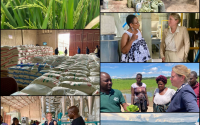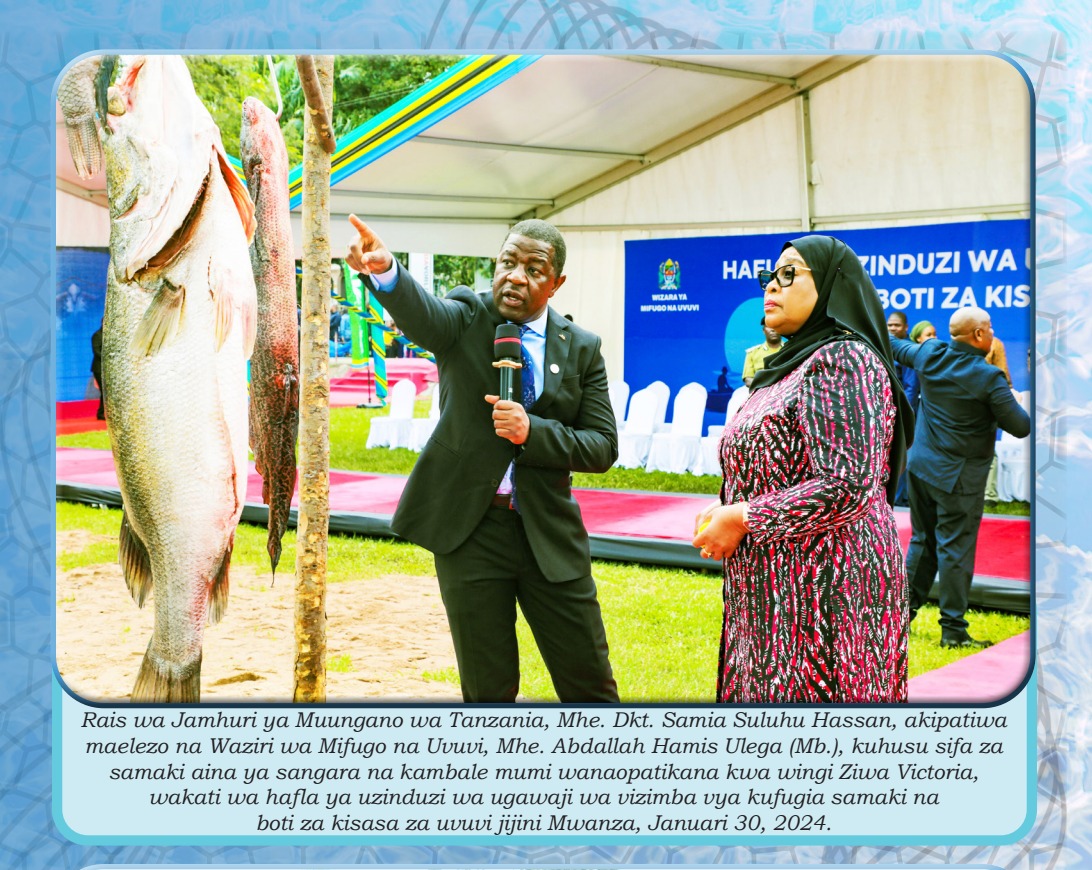Agriculture Sector Development Programme – ASDP II Contributes to Economic Growth, Says Dr. Yonazi
The government will continue prioritizing the development of the agricultural sector as it is crucial for food security, economic growth, and national development.
Dr. Jim Yonazi, the Permanent Secretary of the Prime Minister’s Office in charge of Policy, Parliament, and Coordination of Government Activities, made this statement on August 15, 2023, in Dar es Salaam while opening a Stakeholder Meeting to prepare for the Mid-Term Evaluation of the Second Phase of the Agriculture Sector Development Programme (ASDP II) and the re-planning for the remaining five years. He praised the Programme for its success in enhancing agricultural capacity, contributing significantly to the country’s economic growth.
The ASDP II, implemented over ten years in two phases of five years each, was launched on June 6, 2017/18. The program aims to transform the agricultural sector, including crop farming, livestock, fisheries, and beekeeping, to increase production and efficiency, commercialize agriculture, and improve the income of small and medium farmers. This contributes to food security, nutrition, and the national GDP.
Dr. Yonazi emphasized the agriculture sector’s critical role in the national economy and the livelihoods of many citizens. The sector is a significant contributor to the national GDP and a major player in export goods, providing food sources and over 75% of employment opportunities in Tanzania. In 2021, it contributed 26.1% to the economic activities of the GDP. Thus, Tanzania is committed to a beneficial and efficient agricultural economy, as successes in this sector are essential for rapid national development, food self-sufficiency, and sustainable economic power for all citizens.
Moreover, Dr. Yonazi stated that agriculture is a priority sector, requiring joint efforts from various stakeholders and institutions. It is also linked to non-agricultural sectors through processing, use, and export of agricultural products, raw materials for industries, and markets for manufactured goods. This is why the President has given special priority to agriculture, increasing its budget significantly for two consecutive years.
In his speech, Dr. Yonazi pointed out that the Prime Minister’s Office, as the main coordinator of government activities, is responsible for coordinating the ASDP II. It ensures collaboration across all agricultural and non-agricultural sectors, such as Transportation, Industry, and Commerce, to advance the program’s implementation and effectiveness. Recognizing the program’s importance and its progress, the office coordinates the evaluation and re-planning for the next five years, from 2023 to 2028.
“We are committed to advancing the ASDP II to make it a model of success and ensure it doesn’t fall into the category of unimplemented programs. However, this success is not just through the Prime Minister’s Office but through collaboration and unity with all stakeholders, ensuring efficiency and speed in the program’s execution,” said Dr. Yonazi.
ASDP II focuses on four priority areas: Sustainable Management of Water and Land Use, aiming to increase water availability and efficient land use in agriculture, livestock, and fisheries; Increasing Productivity and Profitability, focusing on high-yield production in priority crops; Enhancing the Value of Agricultural, Livestock, and Fisheries Products for market competitiveness and private sector involvement, and ensuring the establishment of farmers’ associations; and Creating an Enabling Environment for Agricultural Sector Development, facilitating program coordination, awareness, monitoring, evaluation, and institutional strengthening.
Dr. Yonazi acknowledged that the ASDP II evaluation will highlight the achievements of the first five years of implementation. He noted significant advancements, including Sustainable Use of Water and Land with an increase in villages practicing efficient land use, expansion of irrigation areas, and increased water sources for livestock. Other successes include increased productivity and profitability in crops like sugar, meat, and milk; food self-sufficiency averaging 121%, sometimes dropping to 114% but still an increase; and a reduction in the discrepancy between farm and market prices for crops like corn, rice, millet, and sorghum, as well as reduced post-harvest losses in crops like corn, cassava, and milk.
Further achievements in the agricultural sector from ASDP II include sector enablers, coordination, awareness, monitoring, and evaluation that facilitated policy and law reviews related to crops and livestock, increased private sector investment in these areas, and the empowerment of small farmer groups.
Despite these successes, Dr. Yonazi mentioned that the mid-term evaluation of ASDP II will also identify challenges encountered during the first five years of implementation. These challenges will be thoroughly examined and addressed with strategies and plans to utilize them as opportunities for the program’s continued progress. Some challenges include limited funding for implementation, production growth driven more by area expansion than efficiency, slow program execution compared to objectives, financial challenges in coordination, awareness, monitoring, and evaluation, and the impact of COVID-19 on access to international markets and the import of inputs, as well as workforce losses in various sectors.
Regarding the re-planning of ASDP II for the remaining five years, from 2023/24 to 2027/28, Dr. Yonazi provided guidance, stating that, like other plan and strategy reviews, the ASDP II update will involve analyzing various documents and writings related to agricultural sector development in the country. He emphasized the importance of each sector providing accurate and comprehensive data and information to make the evaluation realistic and to enable the newly developed plan to be effectively implemented.
Additionally, Dr. Yonazi directed that Development Partners and the Private Sector, like other stakeholders, will be involved in the evaluation and preparation of the new five-year implementation plan for ASDP II. “We expect your cooperation and essential information to make this exercise beneficial and advantageous for the nation. We also anticipate that your data on strategies implemented in your areas will demonstrate how these strategies are aligned and integrated with the ASDP II and areas for improvement,” he said.
Dr. Yonazi further stated, “Through inclusive participation, we will obtain a realistic picture of our progress in implementation, the challenges, and areas needing attention to achieve the program’s objectives. I believe that the update of ASDP II will realistically reflect the progress towards the goals of agricultural sector transformation as outlined in the Agenda 10/30, sustainable food system reforms, and more.”
At the beginning of his speech, Dr. Yonazi thanked AGRA, for enabling the Prime Minister’s Office to coordinate the review of the first five years (2018–2023) of the Agriculture Sector Development Programme Phase II (ASDP II) implementation and the subsequent preparation of the next five-year plan following the evaluation. He also thanked the Food and Agriculture Organization (FAO) for supporting these efforts, enabling the training of an internal expert team that will collaborate with a lead consultant in the evaluation process. This team will significantly contribute by providing information and feedback considered by the Lead Consultant before expert and leadership meetings. Moreover, he expressed gratitude to the Permanent Secretaries and heads of institutions for attending the meeting and allowing their experts to participate in the initial five-year evaluation of ASDP II.
Dr. Yonazi noted that AGRA has been an important partner for the Prime Minister’s Office and the Ministry of Agriculture, contributing significantly through collaborations that include the Joint Agricultural Sector Review, updating Agricultural Plans at the Council level (DADPs), analysis of the edible oil sub-sector taxation and strategies to boost edible oil production in the country, and preparation of the Agenda 10/30 document.
“I hope this collaboration with other stakeholders will continue to increase during the implementation of the next five years (2023 –2028) of the Agriculture Sector Development Programme Phase II,” said Dr. Yonazi, the Permanent Secretary of the Prime Minister’s Office in charge of Policy, Parliament, and Coordination, opening the one-day meeting to prepare for the ASDP II evaluation at the Protea Courtyard-Hotel in Dar es Salaam.


